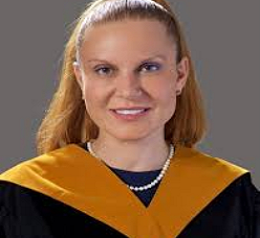INTERNATIONAL WOMEN'S FORUM
THEME: "Breaking Barriers, Shaping the Future of Women"
 17-18 Mar 2025
17-18 Mar 2025  Amsterdam, Netherlands
Amsterdam, Netherlands THEME: "Breaking Barriers, Shaping the Future of Women"
 17-18 Mar 2025
17-18 Mar 2025  Amsterdam, Netherlands
Amsterdam, Netherlands 
American University of Madaba, Jordan
Title: Barefoot Nisswiyya (barefoot feminism)
Wafa Alkhadra is a distinguished academic leader and scholar renowned for her transformative contributions to education, higher education modernization, internationalization, and youth empowerment in entrepreneurship and civic engagement. Serving as Dean, Chairperson, Director at leading institutions, and a member of boards for human rights and research advancement, she has spearheaded reforms that align academia with global standards, foster multi-sectoral partnerships, and establish knowledge transfer units to bridge theory and practice effectively.
Recognized with prestigious honors, including the Harvard Community Organization and Action Scholarship, the Georgetown Leadership Seminar Scholarship, the International Women’s Forum distinction as one of the 2024 Women Who Make a Difference, and Emerald Awards for Outstanding Research in 2023 and 2024. Her dedication to human rights advocacy and activism for equity and inclusion, particularly for the most vulnerable, has led to her recent scholarly paper, published in a special issue of Women Human Rights Defenders (WHRD) in Gender and Development, in collaboration with Oxfam and Routledge/Taylor & Francis. She pioneered groundbreaking theories such as barefoot nisswiyya an introduced innovative research methodologies like Ishrah ( ???? ) and Bawh ( ??? ), which have contributed to giving visibility and inclusion to grassroots female leaders in Jordan, providing them with greater opportunities to participate and make an impact in various fields. Her impactful work in human rights advocacy and curriculum reform in Jordan underscores her unwavering dedication to advancing equity, civic engagement, and academic excellence globally.
This speech introduces barefoot nisswiyya (barefoot feminism), a homegrown and indigenous feminist theory I coined in 2002. Rooted in my personal experiences as an academic activist and fieldwork in rural Jordan, the concept is designed to be inclusive of diverse forms of women’s agency, ownership, and empowerment. It bridges the gap between theory and praxis, providing a framework that resonates with grassroots women and their lived realities. By connecting with nature as Nigel Thrift’s “Fourth Space,” I explore how rural settings become transformative arenas for disrupting hierarchical and patriarchal norms while fostering balance and social change.
Central to this theory are two methodic tools I developed—Bawh [spontaneous intimate articulation and disclosure] and Ishrah [engaging connectedness]—which amplify the voices of grassroots women, including shepherdesses, farmers, factory workers, and janitors. These tools help women vernacularize their stories, asserting their agency and redefining empowerment through their own narratives.
This speech highlights how barefoot nisswiyy(at) navigate patriarchal spaces to mobilize the “Place Space” (Thrift’s Fourth Space) as a platform for collective action. Rejecting traditional models of “femocracy” and power-over paradigms, barefoot nisswiyya centers on indigenous knowledge, grassroots leadership, and the personal-political connection.
By embracing diverse expressions of women’s agency, this theory shapes a new model of Arab feminism that is both inclusive and transformative. It celebrates the profound influence of grassroots women, establishing a framework that honors their ownership of empowerment and their pivotal role in driving community-based social change.